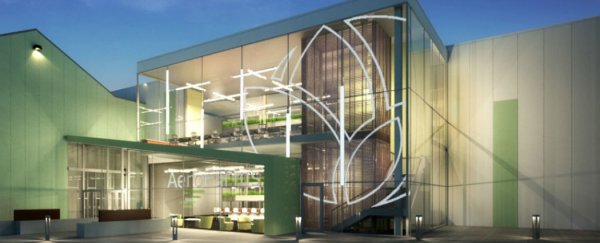A 21,031-square-metre vertical farm will open in Newark, New Jersey later this year, and is expected to grow close to a million kilograms of pesticide-free produce annually. Made out of an old steel factory, the farm will not only be 75 times more productive than a farm of a similar size spread across a flat, open field, but it requires far less to run.
Built by AeroFarms, which is a US-based company intent on creating more environmentally friendly farming solutions, the facility requires zero soil, 95 percent less water than traditional farms, and because it's pesticide-free, doesn't cause any harmful run-off to the environment surrounding it.
The farm also uses recyclable materials, and a lighting system that conserves energy by facilitating more efficient photosynthesis. Web Urbanist explains:
"Plants rooted in reusable microfleece cloth and stacked in modular planters will be sprayed by a nutrient mist and illuminated by LED lights. … The company is 'targeting specific wavelengths of light for more efficient photosynthesis and less energy consumption. LEDs can also be placed much closer to the plants, enabling greater vertical growing for even greater productivity per square foot'."
The farm will also use an 'aeroponic mist', which is packed with nutrients and oxygen so the plants don't suffer from being indoors all the time. This mist has all the nutrients of soil, except the plants don't need to fish through the waste to get at them, so the theory is that they'll grow more robust more quickly.
According to Dan Nosowitz at Modern Farmer, AeroFarms says it will achieve a full crop cycle - so, seed to harvest - in just 16 days. The farm's been tipped to open this year, so we'll soon see if the farm will live up to its promises. I sure hope so. We need better food production solutions, and traditional farming is becoming more and more ill-suited to our progressively resource-poor world.
Just last week, engineering students in Peru came up with their own solution to the problem of farming, by constructing a billboard that doubles as a sustainable and healthy roadside farm and a nifty advertisement for their university. We love ideas like this. Keep them coming.
Sources: Web Urbanist, Modern Farmer
